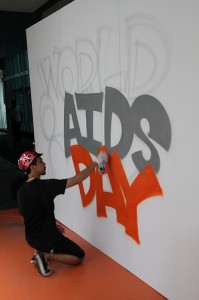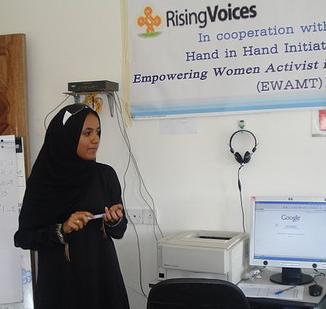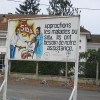December 1 marks World AIDS Day, which has traditionally become a time when people around the world come together to raise awareness about the impact that the pandemic has had on society. This year in many parts of the world, such as Egypt and Kenya, hundreds of events will take place to bring people together for education and activism.
Even though the 2010 UNAIDS Global Report released on November 23 provided some promising news, namely that the global infection rate for new cases has fallen by 19% over the last decade down from 3.1 million in 1999 to 2.6 million in 2009, it is still a disease that affects 33 million people. The report found that much of this progress can be attributed to behavioral change and prevention, as well as the fact that now approximately 5.2 million people have access to treatment, which makes it less likely for them to pass the virus to others.
This is definitely some good news, but when the statistics number in the millions, it is easy to think of each of 33 million people currently infected as just a demographical number. And in some parts of the world, the infection rate does not follow the global trend, which is a reminder that the fight is far from over. That is where citizen media, and Rising Voices’ focus, can come into play by supporting those projects that aim to put a personal face on each of those cases as a member of a local community and to show that HIV/AIDS continues to be a pressing concern.
More and more bloggers, who are either HIV-positive themselves or who are strong advocates for those affected by the disease, have been joining the blogosphere. A map of HIV-positive bloggers and groups who blog about HIV/AIDS was compiled in 2008:
View Blogging Positively in a larger map
Many of these bloggers, such as Juan Carlos [es] from Ecuador, Hector Toscano [es] from Argentina, and Qi Kuan [zh] from Taiwan, continue to blog two years after initially being added to the interactive map.
In addition, Rising Voices grantees, such as Repacted based in Nakuru, Kenya continues its tradition of supporting the Mr. and Ms. Red Ribbon campaign. The campaign is an annual beauty pageant for people living with HIV/AIDS as a way to “celebrate beauty and fight stigma.” AIDS Right Congo, has been publishing bilingual articles about the disease on their blog. In Ukraine, Pavel Kutsev of the Drop-In Center is another advocate who has written about harm reduction practices that can help prevent the spread of HIV/AIDS.
Rising Voices has also been introduced to a number of new projects using citizen media around the world, such as the Key Correspondents. This project is managed by the International HIV/AIDS Alliance and HealthDev.net which supports 250 citizen journalists in 50 countries who write about public health issues including HIV/AIDS. Each citizen journalist shares stories about personal experiences or how the disease has affected their local community. For example, the citizen journalist “Fungaizim” from Zimbabwe recently wrote about a firsthand experience at a Voluntary Counseling and Testing Center (VCT) in Harare in an effort to show whether or not the service can use improvement.
The counsellor assigned to me was a woman who seemed very disinterested in the task of counselling. In fact all she asked me to tell her was where I lived, my age and what brought me to the centre for a test. There was no real dialogue being sought here, just the basic facts about who I was, which is definitely not the way to create a safe environment for a client.
[…]
As she asked her questions, I began to question in my head whether this would be the type of counsellor that people, particularly young people, would feel they could confide in. I mean, even if she asked, I don’t think anyone would feel too comfortable divulging their sexual history to a person so obviously unapproachable. Ultimately, the counselling function of the process is about creating a relationship from the beginning of the journey right to the end, by trying to ensure that the client doesn’t drop out at any stage of the process.
And once the results were available, Fungaizim was deeply concerned about how the counselor presented the outcome. It was noted that it was a different counselor than the one who was involved in the pre-test conversation.
As the post-test counsellor prepared to show me my results, she asked me a deeply loaded question, “Are you sure you won’t kill yourself if you find that you are HIV positive today?” If that isn’t the epitome of the very stigma that we are trying to conquer through testing, then I don’t know what is. How can a counsellor speak in that way and even suggest such a negative reaction to a positive test as death?
Other Key Correspondents that write about the issue HIV/AIDS are based in Cambodia, Zambia, Uganda, among others.
This active participation in the use of citizen media to raise awareness, bring personal stories to light, and help reduce stigma about HIV/AIDS indicates that there is growing interest in the use of these digital tools. This is an ongoing interest of the Rising Voices community. In 2008, members of the RV community came together to hold a series of discussions and interactive live chats about how citizen media can help encourage conversations about the disease and its effect on society. From that, a year later, the Blogging Positively e-guide was developed, released, and subsequently translated into four languages.
In commemoration of World AIDS Day, members of this Blogging Positively community will come together on December 2nd to discuss the next steps for the guide and how to build relationships with projects, organizations, and bloggers that hold this common interest. The live chat (Facebook Event) is open to all interested in this topic. Please visit Rising Voices on December 2nd at 4 PM GMT (11 am New York, 2 pm Buenos Aires, 4 pm London, 6 pm Cape Town, Beirut, 7 pm Nairobi, 9:30 pm New Delhi).





